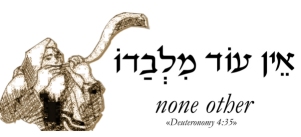|
February 2009 Updates
Personal Update

02.26.09 (Adar 2, 5769) We are expecting our new baby in about 3 weeks! Olga is doing well, though she is getting "ready" to give birth soon... I praise the LORD for His faithful love to us at this time. For those of you who have helped us by praying for us or giving a donation, please accept our heartfelt thanks: you have been as the LORD to our family, and this web site literally would not be here today were it not for your love and support. Again, than you. Please pray for Olga and the new child...esp. that there are no complications or problems with the birth. I will update you here regarding what happens.
Shabbat Shalom and blessings upon you, chaverim...
New Hebrew Meditation
Love's Great Abiding
02.25.09 (Adar 1, 5769) I wrote a new Hebrew meditation (Love's Great Abiding) that's intended to remind us about our great need for God and His Love. I hope you find it helpful, chaverim....

I've also been very busy answering various questions posted on the Q&A section on the Hebrew4Christians public forum recently.
Parashat Terumah - תרומה

02.24.09 (Shevat 30, 5769) The Torah portion for this week is called Terumah, a word that means "contribution," "gift," or "freewill offering." It begins with the LORD asking for gifts "from every man whose heart moves him" to provide materials for the Mishkan Kodesh (Holy Tabernacle), a tent-like structure that would symbolize His Presence among the Israelites during their sojourn to the land of Canaan. Gold, silver, brass, red and purple yarns, fine linens, oils, spices, precious stones, etc., all were needed. No gift was considered too small, and whoever felt prompted by the LORD to give did so freely, without compulsion. God's house is always built by love freely given....
The word mishkan (מִשְׁכָּן) comes from a root (שָׁכַן) meaning "to dwell." This holy tent/compound was intended to provide a place of sacrifice and fellowship with the LORD God of Israel. Since the Mishkan represented God's dwelling place, it became associated with the Shekhinah (שְׁכִינָה), or manifest Presence of God Himself. This is particularly the case regarding the Ark of the Covenant (אָרוֹן הָבְרִית) and its sacred cover called the "Kapporet" (כַּפּרֶת) located within the inner sanctum of the Holy of Holies (קדֶשׁ הַקֳּדָשִׁים). (Note that the term "Mercy Seat" comes from Martin Luther's translation of the Bible into German, where he added to the meaning of kapporet by translating it as a location or "seat" of mercy.) Upon the Kapporet were set two cherubim (כְּרֻבִים) -- angel-like figures with open wings and baby faces. It was from between these faces that the LORD later directly spoke to Moses, it was here that sprinkled sacrificial blood would appeal to God's forgiveness during the appointed time of Yom Kippur.
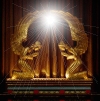
Since "the soul that sins shall die" and "the life is in the blood" (Lev. 17:11), a sacrificial animal's blood sprinkled upon the Kapporet symbolically represented the life of the people who were condemned to die, and this provided a means by which God could extend His forgiveness while remaining entirely holy and just. The substitutionary shedding of blood, the "life-for-life" principle, is essential to the true "at-one-ment" with the LORD God, and the blood rituals all prefigure the greater atoning sacrifice of Yeshua on the cross at Moriah. The passion of Yeshua, in other words, is the ultimate High Priestly work of presenting blood upon the Heavenly Kapporet of God.
It is interesting to note that the word used in the Greek Septuagint to translate the Hebrew word kapporet ("cover") is hilasterion (ἱλαστήριον). The New Testament picks up this usage in Romans 3:25: "God put forward Yeshua as a propitiation (ἱλαστήριον) through faith in His blood." In other words, the sprinkling of Yeshua's blood - represented by His Passion upon the cross - was "presented" upon the Heavenly Kapporet, before the very Throne of God Himself. Yeshua here functions as the great High Priest after the order of Malki-Tzedek who provides everlasting forgiveness for our sins (Heb. 9:7-10:10). Because of His sacrifice, the parochet - the wall-like covering separating the Holy of Holies - was rent asunder and God's love was let loose upon the world! Baruch haShem!
It is important to remember that the detailed instructions for constructing the Mishkan were "according to the pattern given" to Moses at Sinai. In other words, the tent, the furnishings such as the Table of the Bread of Presence (הַשֻּׁלְחָן לֶחֶם פָּנִים), the golden Menorah (מְנוֹרָה), the Bronze Altar for sacrifices (מִזְבֵּחַ הַנְחשֶׁת), the vessels, and so on, were first shown to Moses before they were created. They were copies or "shadows" that were intended to prefigure the eternal reality of the Heavenly Tabernacle itself.
Among other things this lends credence to the idea of "Oral Torah," that is, that Moses was given additional revelation at Sinai that was not included in the written Torah, and this also explains that Moses foreknew that the Messiah would die for the sins of Israel (see John 5:46). After all, the God who spoke to Moses out of the Burning Bush, the God who thundered from Sinai, the God who spoke from between the faces of the cherubim was none other than Yeshua Himself, YHVH come in the flesh. May His Name be honored and revered forever...
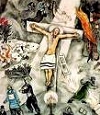
Final Note: According to Midrash, the purpose of the Kapporet was to protect man from the judgment of God as represented by the judging angels, the cherubim. These angels are God's own messengers who must report the truth and cannot deviate from that truth. However, there is a deeper truth than the "mechanical" reporting of facts (i.e., reports about our sins and guilt), and that truth centers on sacrificial love and mercy. The sacrificial blood sprinkled on the Kapporet - representing the innocent taking the place of the guilty - "sidesteps" the issue by removing the curse of the Law from the guilty (cp. Gal. 3:13). This is the "deeper magic" of the sacrifice upon the Stone Table, as C.S. Lewis portrays it in the Chronicles of Narnia. The Kapporet therefore foreshadows the cross of Yeshua, and His shed blood is the means whereby a holy God can righteously forgive our sin. Just as the sins of the nation were atoned for by the sprinkling of the blood on the Kapporet, so the shedding of Yeshua's blood atones for the sins of the entire world. Baruch HaShem for His amazing grace, chaverim!
 |
Inner Laceration...

02.23.09 (Shevat 29, 5769) Shalom, chaverim. I am in need of prayer... I feel like I have been attacked ruthlessly by the enemy lately, and the weariness and pain is almost insufferable. Jesus knows. Please offer up a prayer for me, for my family, and for the coming baby. Thank you.
 NOW IS THE TIME NOW IS THE TIME 
Draw Close to God!

02.20.09 (Shevat 26, 5769) With the world reeling over terrifying economic news, I want to encourage you to focus on spiritual truth and make the study of Torah/New Testament the guiding passion of your days... Time is short: I cannot overemphasize this statement! Now is the time to recommit your life to Jesus (Yeshua) and fervently go after Him... Study Torah, study Hebrew -- get grounded in the Scriptures -- and pray with renewed fervency. Shalom, chaverim.
Birthpangs of the Messiah - חֶבְלֵי מָשִׁיחַ

וּמָה אוֹת בּוֹאֲךָ וְקֵץ הָעוֹלָם / "And what will be the sign of your coming, and that olam ha-zeh is ending?" (Matt. 24:3)
02.18.09 (Shevat 24, 5769) Our world appears to be careening toward a crash... Most of us are troubled, if not frightened. Corruption and decay are all around us and nothing makes much sense any longer.... We cannot trust our politicians. Bankers and big business are anathema. The world is now facing a global economic meltdown - but no one seems to be able to account for the "transfer" (i.e., theft) of literally trillions of dollars. We woke up one day to discover that we were dreaming all along: our "money," based as it was on the absurd "fiat system," suddenly was decreed to be worth-less. And the mainstream "news" offers up nothing but bland government-sponsored propaganda and ideology. There seem to be no genuine leaders whom we can trust; there is no way to obtain good information to make sound decisions; everyone seems out of control. The "Church" has been asleep for years now, either colluding with the world or else self-destructing through postmodern despair. Thinking Christians find themselves alienated from other Christian communities.... The voice of the prophet has been squelched and ghettoized. Tragically, moral truth now comes from a few courageous souls in the alternative media who have chosen to resist the dialectical "force-feeding," yet they are routinely disregarded by most people as agitators or "crackpots." In short, it seems as if our entire culture and way of life is tottering and ready to collapse. We are confused, perplexed and feel threatened.
Yet this is exactly what the "world system" wants you to feel: "confused, perplexed, and threatened," because by this means they can further their plans for social engineering and control without risk of serious dissent...
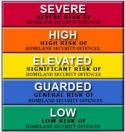
As I wrote yesterday, "there is no fear in love" (אין פַּחַד בָּאַהֲבָה), especially since we know that ein od milvado -- there is no real power apart from HaShem (i.e., He is the only true Power in the universe, despite the menace and threats that mankind routinely practice upon one another).... The LORD God of Israel is in complete control of all things. Indeed, Yeshua is called elyon lemalkhei-aretz (עֶלְיוֹן לְמַלְכֵי־אָרֶץ) - the "Ruler of the princes of the earth" (Rev. 1:5) - and that means they ultimately will answer to Him. Despite the pre-planned deconstruction of the United States and other world economies, we know that the LORD God Almighty reigns, and we need not be subject to the fear of man or his devices. Act counter culturally -- call upon the Name of the LORD and walk in faith, chaverim!

The period of time immediately before the Messiah's arrival is sometimes called ikvot meshicha (עִקְּבוֹת מְשִׁיחַ), the time when the "footsteps of the Messiah" can be heard. This is the time appointed by God for the final Messianic redemption and the close of the present age (olam ha-zeh). For Christians, this refers to the Second Coming of Jesus to judge the nations and establish His kingdom in Jerusalem...
According to traditional Jewish sources (Pesachim 54b; Midrash Tehilim 9:2), no one knows the time when the Messiah will appear -- though there are some hints. God created the world in six days, each of which represents a thousand years. The seventh day is the start of the great Messianic Sabbath Rest, and therefore this age cannot last beyond 6,000 years. According to the traditional Jewish calendar we are living in the year 5769 which means it is "Erev Shabbat" of the world. We are drawing close, in other words, to the prophesied End of Days and the appearance of Yeshua our Messiah!

According to the sages, then, by the year 6,000 the Messiah has to arrive, though he could come earlier. This accords with the teachings of Jesus and His apostolic witnesses (Matt. 24:36-44; 1 Thess 5:1-3; 2 Pet. 3:10; Rev. 3:3). The condition of the world during acharit hayamim (the end of days) will be grossly evil (2 Pet. 3:3; 2 Thess. 2:3-4, 2 Tim. 3:1-5). The world will undergo various forms of tribulation, called chevlei Mashiach - the "birth pangs of the Messiah" (Sanhedrin 98a; Ketubot, Bereshit Rabbah 42:4, Matt. 24:8). Sometimes the birth pangs are said to last for 70 years, with the last 7 years as the most intense period of tribulation -- the "Time of Jacob's Trouble" / עֵת־צָרָה הִיא לְיַעֲקב (Jer. 30:7). The first wave of trouble came from Edom (i.e., "Rome/Europe") in the form of the Holocaust; the second is coming from Ishamel (i.e., the Arab states) in the form of the Arab-Israeli conflict. This accords with the teachings of Jesus in the Olivet Discourse (Matt. 24-25).
Some of the "signs" of this period include the rise of various false prophets, numerous wars and "rumors of wars" (including the rise of Magog), famines, earthquakes, worldwide apostasy from the faith, persecution, and a globalized sort of godlessness that is revealed in unbridled selfishness, greed, chutzpah (audacity), shamelessness, and a general lack of hakarat ha-tov (gratitude). The greatest sign, however, will be that Israel will exist once again as a sovereign nation, despite the prophesied exile among the nations (Deut. 4:27-31; Jer. 30:1-3). According to some of the sages, the 9th century work Pirkei d'Rabbi Eliezer foretells that just before the coming of Messiah, "Ishmael" will rise in power to terrorize the world. According to Yalkut Shimoni, the king of Persia (Iran) is going to "have a weapon that is going to terrorize the world." A coming "Messiah of evil" (code name Armilus) will soon appear on the world stage to offer a peace treaty for Israel and the Middle East, "but when they shall say, "peace and safety" (confirmed covenant) then sudden destruction will come upon them, as labor pains come upon a pregnant woman (time of Jacob's Trouble), and they will not escape (1 Thess. 5:3). This is the significance of the extraordinary cataclysmic world events which we are witnessing this very day....
Ultimately the Great Tribulation period is redemptive and healing (called yissurei ahavah, "the troubles of love"). The prophets wrote that Zion will go through labor and then give birth to children (Isa. 66:8). Thus the Vilna Gaon wrote that the geulah (national redemption) is something like rebirth of the nation of Israel. This accords with the prophetic fulfillment of Yom Kippur as the Day of Judgment and time of Israel's national conversion. In the verse from prophet Jeremiah regarding the "Time of Jacob's Trouble," it's vital to see the goal in mind - "yet out of it he is saved" (וּמִמֶּנָּה יִוָּשֵׁעַ). The sages note that childbirth is a time of radical transition and struggle for the baby -- from the time of relatively peaceful existence within the womb into the harsh light of day -- and therefore a similar transition between this world and the Messianic world to come is about to take place....
Surely we can look to HaShem, may His Name be blessed, to reveal the fulfillment of the redemption soon! Maran ata Yeshua!

"For though the vision awaits its appointed time; it hastens to the end -- it will not lie. If it seems slow, wait for it; it will surely come; it will not delay" (Habakkuk 2:3)
No Fear in Love - אין פַּחַד בָּאַהֲבָה

02.17.09 (Shevat 23, 5769) This week's Torah reading (Mishpatim) concerns social and civil laws of ancient Israel. Concerning the opening statement of the portion: "And these are the ordinances (mishpatim) which you shall set before them," the sages state that this means there must be the recognition of social obligation between man and his fellow man before the obligation between man and God can be embraced (see Matt. 5:23-24). This idea may be summed up as, "respect precedes Torah" (דרך ארץ קדמה לתורה), since without any form of brotherhood, unity, or genuine civility, we are left with anarchy, anomie, and despair...
As we move into the prophesied "End of Days" (אַחֲרִית הַיָּמִים), the world is becoming more and more a place of anarchy, anomie, and despair. Civil law is flouted and every person seems intent on doing "what is right in their own eyes." The storm clouds are gathering, chaverim....
Nonetheless Scripture admonishes us: "There is no fear in love, but perfect love casts out fear" (1 John 4:18). Fear and faith are antithetical, but if you're anything like me, you struggle with fear... The Greek NT says that "perfected love" (ἡ τελεία ἀγάπη) "casts out fear" since it is rooted in the idea of punishment (κόλασις). 1 John 4:18 goes on to say that the one who keeps fearing has not been brought to maturity with regard to love....
My fears often center on the future, for example, regarding the matters of providing for my family, being a good parent and husband, etc. The prospect of the "End of Days" makes me more than a little concerned about the moral and spiritual condition of this country. I sometimes find myself anxiously thinking of my children's future (we are expecting our second child in less than 5 weeks). But sometimes I just find myself in a state of fear without any identifiable reason -- i.e., anxiety -- and then it's more difficult for me to discern the message of this state of soul.... Regardless, there is one thing we can (and must) do to secure ourselves in these perilous times: renew our faith and stand firm with our convictions. If you feel tempted to cave into worldly despair, redouble your efforts to study the Scriptures and hold to the truth that sets you free. Study Torah and the Words of Yeshua our Savior!
Your prayers for us are appreciated, especially regarding this ministry and its future. We are living on the manna God supplies, and (baruch HaShem) He has been faithful! The trouble is not with God's gracious provision but rather with my own anxiety and smallness of faith. Thank you, chaverim.
 |
Parashat Mishpatim - משפטים

02.16.09 (Shevat 22, 5769) The Torah reading for this week is parashat Mishpatim. The word mishpatim (משפטים) means "rules" or "ordinances" and is derived from the Hebrew word shaphat ("to judge"). Parashat Mishpatim is sometimes called Sefer HaBrit ("the Book of the Covenant"), since it contains over 11.5% of all of the mitzvot (commandments) found in the entire Torah (53 of 613). These mishpatim include a wide range of civil laws, criminal laws, ritual laws, financial laws, and family laws that later provided a foundation for the legal reasoning found in formal explanations of halakhah (i.e., the legally binding aspects of the Oral Law).
Parashat Mishpatim is perhaps one of the most crucial portions of Torah for understanding the terms of the sefer habrit (book of the covenant) that was "sprinkled with the blood of bulls and goats" and ratified by the 70 zekanim (elders) at Sinai. For the Messianic Jew, understanding how the New Covenant of Yeshua overtakes the terms of this older covenant is critical for being a true child of God and inheritor of the promises given to Avraham Avinu (our father Abraham). If God wills, I will add some additional comments about this topic later this week....
This coming Sabbath also marks the first of the four that precede Passover, called Shabbat Shekalim (שבת שקלים), "the Sabbath of the Shekels." An additional reading (Exod. 30:11-16) is appended to the regular Torah reading that describes the contribution of a half-shekel from every Jew for the construction and upkeep of the Mishkan (Tabernacle). According to a midrash in the Talmud (Bavli, Shekalim 1), the half-shekel represents a "fiery coin" that the LORD brought from underneath the Throne of His Glory to symbolically "atone" for the sin of the Golden Calf. Since every Jew was required to give this "widow's mite," repentance is accepted for all who come in true humility before the LORD.
Personal Note: We are now only 5 weeks from the due date of our baby boy. It has been stressful lately, but God has been gracious to us. Thank you, chaverim, for your thoughts and prayers....
 |
Chosen People...

[ The following comments are based on this week's Torah reading (Yitro). Please read the Torah portion to "find your place" here. ]
02.13.09 (Shevat 19, 5769) There's an old story (midrash) that says that before God offered the Torah to the children of Israel, He first asked the other nations if they wanted it. God did this so that the nations wouldn't be able to claim that they would have accepted the Torah if only they had been asked. God first asked the children of Esau. "What's in the Torah?" they asked. "You shall not murder," God replied. "Well, we could never accept that," they admitted. "Isaac's blessing to Esau said that we would live by our swords (Gen. 27:40), so how could we stop doing that?" And so they refused to accept the Torah. God then went to ask the children of Ishmael. "What's in it?" they asked. "You must not steal," God answered. "Well, we could never accept a Torah like that, since we make our living by stealing," they admitted. So God decided to ask each of the 70 nations whether they would accept the Torah, but each refused it for one reason or another. Finally God came to the Israelites. "Do you want my Torah?" He asked them. "Of course we want the Torah," they replied -- without even asking what was required of them. kol asher diber Adonai na'aseh ("all that the LORD has spoken, we shall do"). So God gave the Torah to the children of Israel...
We might wonder if this midrash wasn't developed to defend against the charge by various anti-Semites that the Jewish people are ethnocentric, elitist, etc. After all, from a strictly "egalitarian" point of view it seems somewhat scandalous to suggest that God would exclusively choose one group of people at the expense of others.... And perhaps this would be offensive -- if, like "blue blooded" aristocrats who live with a sense of inborn entitlement -- the "chosen ones" believed they were chosen for the sake of self-aggrandizement....

Of course this is not what Judaism means by "chosenness" at all. Being a Jew means that you are "chosen" to take on additional responsibilities to live in holiness for the glory of God and for the welfare of the world. Therefore a Jew takes the role of being a both a mediator (i.e., "priest") and ambassador for God. The performance of various mitzvot are for the greater purpose of tikkun olam, the "repair of the world." After all, Israel was always meant to be a "light to the nations." God's greater plan was for all the families of the earth to come to know Him and give Him glory. "Jewishness" is therefore not an end in itself but rather a means to bring healing truth to the nations... Indeed, the entire redemptive story of the Scriptures is about the cosmic conflict to deliver humanity from the "curse" by means of the "Seed of the woman" who would come. Any talk of genetics, bloodlines, lineage, and so on are a means to this greater redemptive end....
In fact, a chosen person is not selected on the basis of their genetics or lineage, but solely from the personal call and election of God. "For not all who are descended from Israel belong to Israel, and not all are children of Abraham because they are his offspring, but "Through Isaac shall your offspring be named. This means that it is not the children of the flesh who are the children of God, but the children of the promise are counted as offspring" (Rom. 9:6-8). The idea of chosenness therefore is independent of considerations of "flesh" but is directly related to our response to God's promises.... This was true of "Israel at large" in relation to its faithful subset called she'arit Yisrael (i.e., the faithful remnant), just as it is true of those who embrace the promise of salvation through Yeshua the Mashiach.
Therefore the Apostle Peter refers to followers of Jesus as "a chosen race, a royal priesthood, a holy nation, a people for his own possession" (1 Pet. 2:9, cp. Ex. 19:6, Deut. 7:6). This is clearly a reference to both Jews and Gentiles who receive Jesus as their Savior, since he adds: "Once you were not a people, but now you are God's people" (1 Pet. 2:9-10). The Apostle Paul likewise understands Christians to be "chosen people" (Eph. 1:4; 2 Thess. 2:13). All true Christians are b'kehunat Mashiach - in the priesthood of Messiah Yeshua and therefore have direct access to God. This priestly lineage began with Malki-Tzedek (Melchizedek), culminated in Yeshua, and is passed directly to the believer by means of his or her justification and identification with the Lord, "who gave himself for us, that he might redeem us from all iniquity, and purify unto himself a peculiar people (am segulah), zealous of good works" (Titus 2:14).
Within so-called Messianic Judaism, some non-Jewish believers tend to consider themselves as "second-class" members in the family of God. They often tend to be self-deprecatory, calling themselves "wild olive shoots," "Gentile believers," or even "ger tzedek" (a righteous convert). This is most unfortunate, since it robs these precious souls of their true identity as co-heirs of the Kingdom (Gal. 3:9; Titus 3:7), and it also destroys the unity that Jesus sought to bring among God's people (John 17:20-23; Eph. 2:14-15).
While it's indeed true that ancient Israel was composed of various classes of people (Priests, Levites, Israelites, women, converts, slaves, etc.), it's also clear that Yeshua (Jesus) didn't come to create a "caste system" among His followers. In fact, Yeshua turned things upside-down by saying that the "greatest would be the slave of all" (Mark 10:44; Matt. 18:1-4, Matt. 20:25-28). Whoever would be great in the Kingdom must humble himself and walk hatznea lechet - in childlike simplicity before the Lord (Micah 6:8). Jesus transposed the all-too-human view of social relationships by inverting the "natural" order. Do you "seek great things for thyself"? Then take hold of your absolute nothingness before the LORD and serve your fellow man (Jer. 45:5). Show gratitude for the gift of life and quit your vain conceits.
The Apostle Paul - undoubtedly the greatest Torah sage of the apostolic period - taught that in the Messiah there "is neither Jew nor Greek, slave nor free, male nor female" since we are all one (echad) in the Messiah (Gal. 3:28). But what does this mean? Despite the egalitarian ideal, don't we use these very distinctions to this day? On a fleshly level we certainly do. After all, we clearly distinguish between men and women, rich and poor, and various ethnic identities. We all live with these distinctions in the world of basar - the carnal world that is known through sensuous apprehension. However, "from now on we regard no one according to the flesh" (2 Cor 5:16) but we aim to understand, with the help of God, that a follower of Jesus is briah chadashah - a "new creation." Together we are ish-echad chadash ("one new man") designed to live in unity. k'ish echad, b'lev echad - "like a single person with a single heart."
God is said to be no "respecter of persons" (Acts 10:34, Rom. 2:11). He is able to make the unclean clean (Acts 10:28) and to regard those who were once called "Not My People" as "My People" (Hosea 2:23, Matt. 3:9). Indeed, a true Jew is one who is circumcised inwardly, not someone who has undergone spiritual brit millah - "covenant of the word" (Deut 10:16, 30:6; Rom. 2:28-29, 1 Cor. 7:19, Gal. 5:6; 6:15; Phil. 3:3, Col. 2:11, etc.). Indeed, Paul insisted that any merit obtained either through his pedigree or his adherence to the moral law code is accounted as less than nothing in comparison to the imputed righteousness given by means of his relationship with Jesus (Phil. 3:3-8).
So, dear Christian, is it correct to call yourself a "Gentile" believer in Jesus? Is that an adequate label to describe your identity in Him?
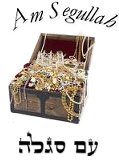
Regardless of your ethnic background, or your gender, or your social status in this world, understand that you are am segulah - precious and elect, and part of the family of God. You are now Kohanim l'El Elyon - priests of the Most High God - "like living stones being built up as a spiritual house, to be a holy priesthood, to offer spiritual sacrifices acceptable to God through Jesus Christ" (1 Pet. 2:5).

Shabbat Shalom chaverim...

Using the Name in Vain...

"Simon, son of Jonas, lovest thou me?" - Jesus
02.12.09 (Shevat 18, 5769) Soren Kierkegaard tells the story of two young portrait artists who both sought to capture the essence of beauty in their paintings. One artist looked high and low for the "perfect face of beauty" but never found it. Tragically, he later gave up painting and lived in despair. The other artist, however, simply painted every face he saw and found beauty in each one. Now here's your question: Which of the two was the sincere artist?
Although this story is about the way we choose to see, it can also be applied to the way we choose to speak (or listen)... Kierkegaard could have used two poets instead of two portrait artists in his vignette. Then we would have two people who both sought to express the "perfect" description of Beauty (i.e., God) in their words. One poet searched all the words in all the world's languages but never found the perfect expression; the other, however, found words of praise for everything he encountered using the plain language of "mama loshen" - the language of heart. Again, which of the two was the real poet?
There are people out there who want to find the "perfect Name" for the LORD, and often focus in on the Name YHVH (יהוה) in the pages of Tanakh.... In Jewish tradition, of course, it is forbidden to utter this Name (except by the High Priest during the Yom Kippur ceremony) and therefore various substitutions are used in its place. This custom is meant to avoid breaking the third commandment, "you shall not lift up the Name of the LORD in vain (lashav), a word that means in an empty or thoughtless manner (the LXX translates lashav as ἐπὶ ματαίῳ, "worthlessly" or "thoughtlessly"). Obviously "lifting up the Name" of God lashav includes the use of profanity, but it also includes "lip-service" expressions of faith, mechanical confessions, heartless acts of service, etc. The prohibition, in other words, means that God wants you to engage Him with "kavanah" (concentration): You cannot "call upon His Name" without first exercising reverence by recognizing His all-consuming glory and power...

When we bless others we are exercising our likeness to God ("lifting up the name"), but when we curse others, we do the opposite. "Life and death are in the power of the tongue" (Prov. 18:21). The false prophet Balaam (bil'am) was named "swallowing the people" (עַם + בֶּלַע) by his mother. How strange, and yet some people apparently want to give birth to "charmers," to occultic seers -- even to "homicide bombers" and those whose life's mission is to curse people... Moses was given his name by an Egyptian princess who adopted him (the Egyptian root appears in the names Ahmoses, Ramsees, etc.), but God overruled her linguistic intent by having the child "draw the people of out" of Egypt. Balaam's mouth was likewise overruled when he sought to curse the children of Israel. The LORD took hold of his tongue and made this "donkey" of a man speak words of truth....
Getting back to the Name of God... There are hundreds of Names and Titles, each one revealing something about the attributes and character of the LORD, and each one therefore worthy of study and appreciation. The main Name, the personal Name, however, is YHVH (יהוה), and among some people it's become something like the "quest for the Holy Grail" to discover how to pronounce it correctly. It is interesting to note that though the Greek language was capable of transliterating this Name, it was never done, not in the the Septuagint (i.e., the ancient Greek translation of the OT), nor in the Greek New Testament, where the name ὁ θεὸς was used in place of YHVH (יהוה). We have no textual evidence that Yeshua ever used this Name (he apparently followed the practice of using the circumlocution of "Adonai"). Of course Yeshua's most common Name for God that we know about was "Father" (πατήρ in Greek; אֲבִי or אַבָּא in Hebrew).
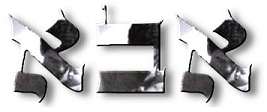
Following Kierkegaard's lead, let's consider the knowledge of the Name of God (i.e., the use of our religious language) from a different perspective. Kierkegaard notes that we can "know" things in different ways. What he calls "the way of objectivity" concerns itself with what is reflected upon. In the case of religious language, the concern would be whether this form of language, this word, this utterance, "represents" the true God. Knowing the Name of God "objectively," then, is about truth, power, invocation, etc. To the objectivist, knowing the Name is about Hebrew letters, about sounds, about symbols, and ultimately about obtaining some kind of spiritual power... On the other hand, what Kierkegaard calls "the way of subjectivity" concerns the "how" or "mode" in which our language relates to God. Only when we use language relating to God in a "God-relation," that is, in worship, humility, and abandonment to the glory of God, do we properly "speak" the Name of the LORD. Here's how he once put this idea:
If someone lives in the midst of Christianity and enters, with knowledge of the true idea of God, the house of God, the house of the true God, and prays, but prays in untruth, and if someone lives in an idolatrous land but prays with all the passion of infinity, although his eyes are resting upon the image of an idol – where, then, is there more truth? The one prays in truth to God although he is worshipping an idol; the other prays in untruth to the true God and is therefore in truth worshipping an idol.
The point here is simple. God is not as concerned about your "orthodox terminology" as much as he is looking for you to passionately and truly seek His face. The service of your lips must be accompanied with genuine service of the heart, lest the Name be used "lashav" - in vain... The same can be said about invoking the Name of God. God is not a snob. He doesn't get offended if someone might "lisp" His Name or tangle up their words when they call upon Him... God looks at the heart and to see if the soul truly wants His Holy Presence. As the prophet said, "You will seek me and find me, when you seek me with all your heart, and I will be found by you, declares the LORD" (Jer. 29:13-14).
Knowing the Name of the LORD means being in a personal, vital, and all-important relationship with the truth. The Holy Spirit is called the Spirit of Truth (רוּחַ הָאֱמֶת). This means understanding God's character as "merciful and gracious, slow to anger, and abounding in steadfast love and faithfulness, extending kindness to the thousandth generation, forgiving iniquity, transgression, and sin" (Exod. 34:6-7). Since the Hebrew idea of word (דָּבָר) is coextensive with truth (i.e., "thing"), Jesus is called the Word of God (דְּבַר אֱלהִים) who represents the Name of God to all who trust in Him (John 17:26, Heb. 1:3). Jesus (Yeshua) is the Name of God, the "thing" of God, the "substance" of God, the "exact imprint and representation of His nature," and so on.
As a final note, I am NOT suggesting that it is unimportant to study Hebrew and learn the Hebrew Names and Titles of God! We should always strive to apprehend the revelation of the Scriptures as clearly as possible, and we must "translate" the source text into our own target language. My point here is simply not to "miss the forest for the trees." There is a deeper message from God regarding His Name that transcends morphology, phonetics, linguistics, etc. "God is love" (ὁ θεὸς ἀγάπη ἐστίν); "God is Light" (ὁ θεὸς φῶς ἐστιν), "God is Spirit" (ὁ θεός πνεῦμα ἐστίν); "God is goodness" (ὁ θεός ἀγαθὸς ἐστίν), etc. There is a big difference between knowing about God and knowing Him personally, in living relationship... Shalom, chaverim.
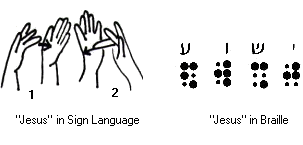 |
May God give you a heart to seek and find Him today....
Triunity, Muliplicity in Oneness

"I and the Father are One" - Jesus
02.11.09 (Shevat 17, 5769) The other day I warned that certain "Messianic" teachers will attempt to seduce you into thinking that "following the law of Moses" is the best way to express your faith in Jesus... Beware, chaverim. These false teachers imply that the cross of Messiah is not enough. "True," they hiss, "we are 'saved' by grace -- but the rest is up to us..." In other words, Jesus lived and died to renew the covenant of Moses, and therefore we must return to Sinai. Our focus should be on Moses and the law.
Because of this, it's not surprising to see why so many of these "Torah observant" teachers struggle with the idea that Jesus is none other than YHVH come "in the flesh." Though they might accept the idea that Jesus was the Jewish Messiah, they appear to have trouble with the idea that "God has a Son" and therefore struggle with the idea of the "Trinity" (השׁלושׁ הקּדושׁ) -- or the Triune nature of the Godhead.
The idea of the "Trinity," however, is clearly implied in the Scriptures. From the first letter of Torah (i.e., the Bet in the word "Bereshit") through the last letter of the New Testament (i.e., the Nun in the word "Amen") -- the letters of which spell the word בּן ("Son") -- we see God as defined as One yet expressing Himself in different Persons:
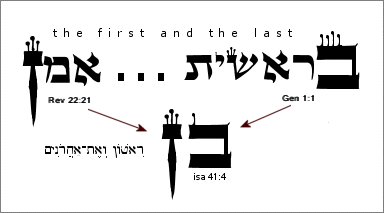 |
Indeed, the very beginning of the Torah (Gen. 1:1-2) speaks about the creative activity of Elohim (God) and the presence of Ruach Elohim (the Spirit of God) as narrated by an omniscient Voice or Word of God. Obviously the Spirit of God is God Himself (who else?) just as the Word of God is likewise God Himself, and therefore the Scriptures begin with the idea that God represents Multiplicity within Unity. The word for God (אֱלהִים) is plural in form, uses plural pronouns: "Let us make man in our image" (Gen. 1:26), and often is the subject of singular verbs.
In the Shema we read, "Shema Yisrael (Hear, O Israel): Adonai Eloheinu (the Lord our Gods), Adonai Echad (the Lord is one)." Interestingly, the word echad in Hebrew can imply a unity in diversity (the word for one and only one, i.e., unique, is more often rendered as yachid). For example, in Exodus 26:6 the parts of the Tabernacle (mishkan) are to be constructed so that "it shall be one (echad) tabernacle," and Ezekiel spoke of two "sticks" (representing fragmented Israel) as being reunited into one: "and they shall be one (echad) stick in My hand" (Ezek. 37:19).

Moses also uses the word echad in Genesis 2:24 when he says: "And they (husband and wife) will become one flesh (basar echad)."
The idea of the triunity of God does not impugn the Oneness of God, but it transcends rabbinical Judaism and Islam's idea of "absolute monism" by understanding oneness in reference to an eternality of intrapersonal community. In other words, Ultimate Reality is multidimensional, personal and loving, and that is part of the very essence of God. There is no such thing as a "Person" - either human or Divine - that exists in an absolute vacuum, outside of relationship. Aristotle's "Unmoved Mover" is a solipsistic illusion and logical absurdity....
As for the deity of Jesus, Paul quoted Isaiah 45:23: "I have sworn by myself, the word is gone out of my mouth in righteousness, and shall not return, that unto me every knee shall bow, every tongue shall swear" and applied it directly to Jesus: "Therefore God has highly exalted him and bestowed on him the name that is above every name, so that at the name of Jesus every knee should bow, in heaven and on earth and under the earth, and every tongue confess that Jesus the Messiah is Lord (YHVH), to the glory of God the Father" (Phil. 2:9-11; see also Rom. 14:11). The Apostle John also identifies Jesus with YHVH, the "First and the Last" of whom there is no other god (Isa. 44:6; Rev. 22:13, etc.). The very idea that Jesus is Melekh ha-Mashiach, the King of Israel, implies that He is none other than God, since only YHVH is the true King of Israel (Isa. 44:6).
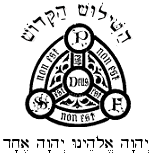
The Triunity is Jewish in origin... It does not derive from pagan ideas of "tri-theism" (Osirus-Isis-Horus) nor does it imply the worship of "three gods" (as has been slanderously charged by various adherents of Judaism and Islam). It predates the ideas of Gnostic modalism (2nd century AD), the Kabbalah's doctrine of the sefirot as emanation from a triadic First Principle of the universe (14th century AD), and the Hindu modalism of "Trimurti" (4th century AD). The doctrine that there is only One God that is multidimensional (One what, Three who's) exceeds the power of analogy, though we understand ourselves in three temporal modes (past-present-future) located in three spatial dimensions... Our bodies are also triune - body, soul, and spirit, and the world around us as a triunity of space, time, and matter.
Yeshua Ha-Mashiach (Jesus Christ) is YHVH "come in the flesh" (1 Jn. 4:2-3). Indeed, to say "Jesus Christ is Lord" (Phil 2:11; Rom. 10:9) is to confess Him as Adonai -- or YHVH -- Himself . As Jesus Himself said, "Whoever does not honor the Son does not honor the Father who sent Him" (John 5:22-23).
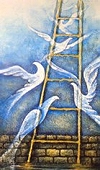
"Who has ascended to heaven and come down? What is his name, and what is his son's name? Surely you know! / מַה־שְּׁמוֹ וּמַה־שֶּׁם־בְּנוֹ כִּי תֵדָע (Prov. 30:4).
Parashat Yitro - יתרו

[ The following introduces this week's Torah reading (Yitro). Please read the Torah portion to "find your place" here. ]
02.09.09 (Shevat 16, 5769) The Torah reading for this week is named in honor of Moses' father-in-law Yitro, an idol-worshipping priest of Midian who later became a true convert to the LORD God of Israel.
After Moses encountered the LORD in the burning bush vision, he talked with his father-in-law and explained that he was going to leave Midian for Egypt to deliver the Israelites from their bondage to Pharaoh. Yitro was perhaps skeptical of his son-in-law's mission but consented to let him go. When he later heard that the Israelites had successfully fled from Egypt, however, Yitro immediately left for Rephidim (the location of the Israelite camp after the battle with the Amalekites) and saw the Israelites for himself. After listening to Moses' account of the LORD's victory in Egypt, Yitro renounced his idolatry and became the first official proselyte to Israelite religion (Exod. 18:8-12). According to Midrash, the phrase vayichad Yitro (וַיִּחַדְּ יִתְרוֹ) / "And Jethro rejoiced" (Exod. 18:9) means that he became a Jew by cutting his flesh with a sharp knife in order to circumcise himself (Tanchuma, Sanhedrin 94).
If God wills, I will add additional commentary to this incredible portion of Torah -- which includes the giving of the Ten Commandments at Sinai -- later this week. Shalom for now, chaverim....
 |
Torah Observance Redux?

02.08.09 (Shevat 15, 5769) The other day someone asked me whether Christians are obligated to "follow the law" of Moses. After all, since Jesus was an observant Jew, and since we're called to follow Him, shouldn't we live as observant Jews as well?
This question is deceptively simple yet enormously complex, as most of you know. If it resolves to the question as to whether we should study and obey the Torah as Jesus did, then the answer is yes, though of course we must be clear exactly what this means, especially in light of the collective teaching of the New Testament. Jesus said he was the "goal" (τέλος) and focal point of the Law and Prophets: "Do not think that I have come to destroy (καταλύω) the Law or the Prophets; I have not come to abolish them but to fulfill (πληρόω) them. For truly, I say to you, until heaven and earth pass away, not an iota, not a dot, will pass from the Law until all is accomplished (πάντα γένηται)." Understanding exactly what Jesus meant by this statement (and therefore understanding his view of the Torah) defies simplistic answers, however, and that is part of the reason why his message was rejected by the Jewish sages of his day.
On the other hand, if the question resolves to whether a Christian should follow the interpretation of the law (i.e., halakhah) as developed by the rabbis of the post-Second Temple period, then it should be obvious that Christians are not subject to any authority that rejects the true King of Israel (i.e., Yeshua the Mashiach). Indeed, despite the Council of Yavne and its legacy (i.e., Mishnah/Talmud), there simply is no Torah-based Judaism apart from the Holy Temple: Over 40% (247) of the 613 mitzvot (commandments) concern the ceremonial and cultic laws of the Mishkan (Tabernacle). When the Second Temple was destroyed, the rabbis replaced the role of the priesthood with that of the sage (i.e., rabbi) and redefined central concepts of the written Torah. Therefore the "Oral Law" claimed that study, prayer and good deeds replace the need for sacrifices at the Temple, regardless of the clear statements from the Torah itself. As a product of Pharisaic reasoning, it should be clear that the Oral Law (which is similar to the Catholic dogma of the "Magisterium") holds no authority over the life the Christian.
Note that Rabbinical Judaism, not Christianity, has a problem here, since according to Yeshua, the true Temple of God is his body offered up upon the cross at Moriah. Indeed, in every aspect of the written law's requirements we see the surpassing glory of God in Yeshua: in the ceremonial law (as the ultimate High Priest, Sacrifice, and Temple), in social law (in promoting egalitarianism, transcending tribalism/racism, in Kingship of Mashiach), in the moral law (in the ethic of sacrificial love), and especially in the power to transform the human heart. "You've heard that it was said to the ancients (κούσατε ὅτι ἐρρέθη τοῖς ἀρχαίοις), but I say to you... (Matt. 5:21-ff). This is the voice of Authority coming from a new mountain, chaverim...
Tragically, however, there are a large number of "Messianic Jewish" groups out there that will try to persuade you that Christians should "follow the law" as envisioned and interpreted by the rabbis.... "It's great," they say, "that you're a 'Christian' (ahem), but NOW I am going to give you the 'real story' about following the Jewish Messiah... Now I am going to give you secret wisdom that will set you free from all the lies you've heard over the years in your Gentile 'churches'... Look, if you really want to follow Jesus, you've got to follow the laws, regulations, and ordinances given in the Torah....You've got to live as a Jew! Keep the Sabbath. Eat Kosher. Follow the mitzvot (commandments). You've got to drop your pagan ways and realize that 'Torah observance' is the next step after the conversion of the believer... blah blah blah...."
Often such groups (or teachers) are ill-informed and love to get into high-sounding, even esoteric language about God and Jewish religion... "Don't touch this; don't do that...according to human precepts and teachings... These have indeed an appearance of wisdom in promoting self-made religion and asceticism and severity to the body, but they are of no value in stopping the indulgence of the flesh" (Col. 2:21-23). Note that there is indeed an "appearance of wisdom in promoting self-made religion," but this is a vain exercise that's unable to truly change the heart... Instead of the liberty and glory of the simple gospel message, we are told we have to add something "man-made" -- something offered by the sweat of Cain's brow...
Though there was a "glory of the older covenant," that glory was destined to fade away (καταργέω) in light of the greater glory of Jesus (2 Cor. 3:7). I urge you therefore to beware the obfuscation and deceit of those who teach that the Gospel of Jesus is somehow "not enough" or needs to be supplemented. Beware of those who blaspheme by saying that Yeshua came to merely "renew" the covenant of Sinai rather than delivering us through the new covenant of Zion.... Beware of those who affect an outward show of spirituality and thereby imply that the weak, the foolish, and the ragamuffin are somehow excluded from God's favor. Beware of those who traffic in spiritual pride, chaverim...
Invariably such "Torah observant" groups will attempt to impress you with their knowledge of Hebrew or their talk about the "Jewish roots" of Christianity. Since you don't know the "language game" as well as they do, you might feel overwhelmed listening to their jargon, perhaps even a bit intimidated. Don't let them blow any smoke your way. Don't get caught up in appearances or be "wowed" over sound bites. They might "dress up" as ultra-Orthodox Jews and even sport earlocks. They might blow really cool looking shofars or chant Hebrew prayers fluently, but I appeal to you in the Name of the LORD God Almighty: Judge righteous judgment, chaverim...
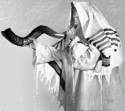
Don't settle for flash or special effects. Push them on the issues, especially regarding the clear teaching of the New Testament. Be relentless and seek the truth. Here are some questions you can use to "test the spirits," chaverim. Ask them EXACTLY what they mean by the word "Torah" -- especially in light of the covenantal acts of God in the Person of Yeshua, our Savior... Ask them EXACTLY what "sanctification" means to them. Ask them whether they regard the writings of the Apostle Paul as having the same authority as the Law of Moses. Ask them EXACTLY what they mean by "new" in the term "New Covenant." Ask them if they believe that Yeshua is none other than YHVH speaking in the flesh.... In short, if there's any hint that "Torah observance" is a means of finding merit before the LORD God of Israel, the message of the Cross is being compromised...
Perhaps you are thinking that all I've been saying undermines the value of this ministry? Well, if I ever suggest that Christians should become Jews in the sense defined by the rabbis of Judaism, you should call me a false teacher and be done with me, chaverim... I am not here to scratch any "itching ears" (2 Tim. 4:3). God forbid. No, this ministry is entirely grace-based and focused on the glory of God revealed in the Person and work of Yeshua the Messiah. We are saved by God's grace (alone) through faith (alone) in the finished work of Yeshua (alone). And as a pertinent reminder for any "Torah observant" visitors here -- this site is called "Hebrew for Christians" for a reason. I am unapologetically a Christian and I not ashamed of the simplicity of the gospel message. There is no "charade" going on here.
Anyway, since I get asked "whether a Christian should follow the law" fairly regularly, I thought it would be good for me to "go on record" once again and restate my view on this subject as clearly as possible. So, in answer to the question, "Should a Christian follow the law (as understood by rabbinical Judaism)?", my answer is simply: NO. In case I am still being unclear, please first take a few moments to read this article.
The Apostle Paul, surely the greatest Torah sage of his day, likened those who confused the terms of the covenant made at Sinai with the New Covenant made at Zion as being no less than spiritual adulterers. Trying to "mix the old and new wine" creates a witch's brew that leads to spiritual promiscuity before God:
Do you not know, brothers - for I am speaking to those who know the law - that the law is binding on a person only as long as he lives? Thus a married woman is bound by law to her husband while he lives, but if her husband dies she is released from the law of marriage. Accordingly, she will be called an adulteress if she lives with another man while her husband is alive. But if her husband dies, she is free from that law, and if she marries another man she is not an adulteress.
Likewise, my brothers, you also have died to the law through the body of Christ, so that you may belong to another, to him who has been raised from the dead, in order that we may bear fruit for God (Romans 7:1-4).
We are therefore in no way obligated to follow the laws of rabbinical Judaism, especially in attempt to acquire spiritual merit that defines personal sanctity or holiness. Our righteousness and sanctification are imputed - by faith - through the gift of God in the Mashiach Yeshua: "...whom God made our wisdom and our righteousness and sanctification and redemption" (1 Cor. 1:30). Christians are made tzaddikim because of the Tzaddik ha-Gadol Yeshua...
Recall that when the covenant was given at Sinai, Moses took some blood from sacrificial animals, threw half upon the altar, and then read the terms of the covenant to the people. The people ratified the covenant with the words kol asher diber Adonai na'aseh v'nishma: "all that the LORD says we will do and obey" (Exod. 24:7). Upon hearing their ratification, Moses took the other half of the sacrificial blood and threw it on the people saying, "Behold the blood of the covenant that the LORD has made with you in accordance with all these words." The "match" was made and the bride had agreed to the Groom's proposal... After this Moses and 70 of the elders of Israel ascended Sinai to eat a "covenant affirmation meal" between Israel and the LORD. It was there that the elders beheld the awesome glory of Elohei Yisrael (the God of Israel), under whose feet was "a pavement of sapphires, like the very heaven for clearness" (Exod. 24:9-10). The Sinai experience was a "marriage ceremony" between the newly redeemed Israelites and the LORD.
Now reconsider what Paul wrote when he said Christians were "married to another." This harkens to when Yeshua told his disciples that His shed blood constituted the New Covenant (הַבְּרִית הַחֲדָשָׁה) with Israel. In the Upper Room after eating the Passover meal, Yeshua lifted the Cup of Redemption and said: "This cup is the new covenant in my blood" (Matt. 26:27-39; Luke 22:20). The Cup of Redemption signifies God's promise to Israel just before the Exodus: "I will redeem you with a demonstration of my power." This cup also symbolizes participation in the ketubah (marriage contract) of the New Covenant, in which the groom (chatan) signifies his pledge by sharing a cup of wine with His bride (kallah). Passover, therefore, was originally intended to be the model for the Christian practice of Communion (or the "Lord's Supper"). The author of the Book of Hebrews calls this דַם בְּרִית עוֹלָם / "the blood of the everlasting covenant" (Heb. 13:20). The covenant of Yeshua opens up Zion to us all... Sinai never brought us there.
As Paul also points out in the analogy of Hagar and Sarah, the Torah of Moses is far more extensive and glorious than the rabbis imagine. The heart of the Torah's message is love, and love is the "law" of the Gospel... Often so-called "Messianic Jews" fall in step with rabbinical thinking, but they do not go back far enough. They do both too little and too much in their theology. They have yet to clearly understand the radical nature of the Gospel message itself... The are scandalized by the idea of grace...
Recall Paul's words:
"For you, brothers, became imitators of the ekklesia of God in the Messiah Yeshua that are in Judea. For you suffered the same things from your own countrymen as they did from the Jews, who killed both the Lord Jesus and the prophets, and drove us out, and displease God and oppose all mankind by hindering us from speaking to the Gentiles that they might be saved - so as always to fill up the measure of their sins" (1 Thess. 2:14-16).
There is the law of Moses and the meritocracy of traditional Judaism, and there is the gospel of Messiah and the grace of His love. You must choose your authority regarding the meaning of Torah: Yeshua's or the rabbis.... You can't have it both ways, and any admixture of the two eventually leads to perversion and error.
So should we then abandon the study of the Jewish roots of Christianity? Should we forget Torah study? By no means! The problem never was with the Torah or the terms of Sinai, but with our inability to abide by the terms of the Covenant (Rom. 8:3; Gal. 3:10-13). The Torah is not sinful, but the human heart is desperately wicked and in need of salvation... All Scripture (including the Torah, of course) was given by God and is profitable for training in righteousness (2 Tim. 3:16-17). Jesus Himself taught from the Torah, the Prophets, and the Writings (Luke 24:27), so why would you want to a return to a Gentile-informed Christianity that has incorporated much Greek/Roman paganism into its theology? Why would you close your eyes to the essential Jewishness of Jesus and the importance of the Torah? But that said, it is IMPERATIVE to keep the distinction between "Torah" and "Covenant" distinct -- or else you will fall into the "Ebionite heresy" (which is essentially what many so-called "Torah Observant" messianic ministries do). Beware of the "concision" (Phil. 3:2). Re-read the books of Galatians, Hebrews, and take the time to savor Yeshua's message called the "Sermon on the Mount."
As always we must find a balance. Yeshua was a Jew, born King of the Jews, but that doesn't mean He came and died to make us followers of the rabbis... The rabbis who rejected Yeshua had established "Judaism without the Temple" after its destruction in 70 AD. The authority of the rabbis was consolidated at that time and various dogmatic traditions were established among the Diaspora Jews... But none of that means that ancient "Judaism" -- and Torah study in particular -- isn't essential to properly reading and understanding the message of the New Testament. It is, and if we don't take the time and effort to clearly understand the Torah and the Prophets, we are liable to misinterpret the words of the New Testament...
Much more can be said about this subject, of course, and I don't want to repeat myself here. For some additional reading, please see the following articles:
There are also some interesting discussions on this subject on the Hebrew4Christians online discussion forum. Shalom for now, Chaverim.
Tu B'Shevat - טו בשבט

02.09.09 (Shevat 15, 5769) Sunday, February 8th at sundown is Tu B'Shevat (the 15th of Shevat), the "Rosh Hashanah" (New Year) for trees, observed throughout Israel as sort of national Arbor Day. Though it occurs in January/February on our Gregorian calendar, Tu B'Shevat traditionally marks the first day of Spring in Israel (since the earliest-blooming trees begin a new fruit-bearing cycle). Often this day is commemorated by reciting a blessing, eating some of the fruit of land, and perhaps even planting a new tree. You can make a donation to the Jewish National Fund to have a tree planted in memory of a loved one by clicking here.
"Behold the Goat of God"
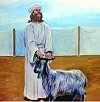
02.06.09 (Shevat 12, 5769) Today someone asked me how Jesus could be understood as a sin offering since the Torah commands that a goat be offered for sins. Well, first it should be noted that the Levitical laws for a sin offering (korban chatat - קרבן חטאת) did not require a goat per se, but any one of three different kinds of defect-free kosher animals (bullock, goat, lamb), depending on the circumstances. A turtle dove was also permitted to be offered if the person was very poor. For Yom Kippur, of course, a bullock and two goats were required: one goat was for blood sacrifice in the Holy of Holies (the Goat of God) and the other was used as a "scapegoat" for the sins of the community (the goat of Azazel / the devil). The Gospels seem to emphasize the connection between Yeshua as the "Lamb of God who takes away the sins of the world" with Passover/Exodus more than the connection between Yeshua as the "Goat of God" whose blood is sprinkled upon the Mercy Seat with Yom Kippur - though the author of the Book of Hebrews explicitly makes this connection (Heb. 9:11-12; 24-ff).
Note that the original Passover sacrifice (korban Pesach) was not given to the Levitical priesthood as a sin offering, since it preceded Sinai and the giving of the various laws concerning the Mishkan/Temple sacrificial rites. In the same way, Yeshua's sacrifice was directed from Heaven itself by means of the prophetic office of Malki-Tzedek (מַלְכִּי־צֶדֶק) - a higher order of priesthood (Gen. 14:18; Ps. 110:4; Heb. 7). Yeshua both offered Himself up as the "Lamb of God" that causes the wrath of God to (eternally) pass over those who personally trust in Him, and He also offered himself as the "Goat of God" whose blood was sprinkled in the Holy of Holies to cleanse us from sin and give us (everlasting) atonement. (Other metaphors are also given in Scripture, of course. For example, Yeshua offered Himself as the Snake lifted up (John 3:14-15; cp. Num. 21:4-9), as a Red Cow (parah adumah), and so on).
Yeshua as the "Lamb of God" pictures personal redemption from slavery to Satan and freedom from the wrath of God. This is the greater Passover/Exodus connection. By means of Yeshua's shed blood and broken body, the wrath of God passes over us and we are set free to serve God.... Yeshua as the "Goat of God" pictures both personal cleansing (i.e., "propitiation" or "expiation" for our sins: the Greek word (ἱλαστήριον) is used in the LXX for the kapporet (Mercy Seat) in the Holy of Holies which was sprinkled with the blood of the sacrifice on Yom Kippur) as well as national teshuvah and cleansing for ethnic Israel at the end of the Great Tribulation period. At that time Yeshua will function as Israel's true High Priest whose sacrifice is applied for Israel's Atonement. This is the Yom Kippur connection. Moreover, since Yom Kippur points to the removal of the sin-laden goat (representing Satan), the Millennial reign of Messiah will be one unmolested by the powers of evil.

Just as Rosh Hashanah reveals the coming time of Judgment and the rapture of the kehillat Mashiach (Bride of Messiah), Yom Kippur prophetically pictures the Day of the LORD or the Day of Judgment in Acharit HaYamim [the last days]. After the judgment of the nations during the Great Tribulation, national Israel will be fully restored to the LORD and their sins will be purged (see Matthew 24). Indeed, our beloved Mashiach will one day return to Israel, cleanse her Temple, restore her to Himself, and set up His glorious kingdom.
The Love Story of Exodus...

[ The following explores some themes found in this week's Torah reading (Beshalach). Please read the previous entries to "find your place" here. ]
02.05.09 (Shevat 11, 5769) The story of the Exodus can be read as a great "Cinderella-like" love story. The beloved is imprisoned in far away castle, made to do the lowliest of labor, but the Lover soon appears to heroically rescue her from her distress. Together they run away into the dangerous desert where the Lover woos, protects and cares for his beloved. Eventually they pledge their undying love for one another and their married life begins...
Or so goes the story... But practically speaking, how would God - the Creator and LORD of all - "woo" a nation? What would such a courtship be like? How would the betrothed come to understand the Heavenly Bridegroom? For that matter, how would the betrothed come to understand herself?
Recall that after the LORD split the sea and led his people safely across, Israel sang a song of praise to Him. Shirat Hayam (the Song of the Sea) is an "antiphon", or song of response to the loving deliverance given by the LORD (Exod. 15:1-21). "The LORD is my strength and my song, and he has become my salvation; this is my God, and I will praise him, my father's God, and I will exalt him..." "Who is like you, O LORD, among the gods? Who is like you, majestic in holiness, awesome in glorious deeds, doing wonders? ... You have led in your steadfast love the people whom you have redeemed; you have guided them by your strength to your holy abode... You will bring them in and plant them on your own mountain, the place, O LORD, which you have made for your abode, the sanctuary, O Lord, which your hands have established."
Note further that the opening statement, "Then they sang" is actually in the future tense: "Then they will sing," which the sages say refers to the coming of Messiah. Indeed, in Revelation 15:3 we read that the song will indeed be sung to the Heavenly Bridegroom in the coming New Jerusalem... Note also that in the closing phrase, "the LORD will reign forever" (Exod. 15:18), the word "will reign" (יִמְלךְ) is spelled with a missing Vav, which suggests the Messiah Yeshua. The LORD will indeed reign when the rightful heir to the throne of David and the true King of Israel soon appears....
At this point in their relationship, the betrothed knew the Divine Bridegroom in terms of His heroic deliverance and power, and even held hope of being led to His "holy abode" to dwell with Him... But how well did she know Him? Would she willingly give herself to Him because she truly loved and trusted Him, or would she merely submit because she was overawed by His power and glory? How could she learn her own heart, and how could God show her who she was meant to be?
In a word - testing... When God delivered Israel from Egypt, He did not take them on the fast track to the Promised Land (though He certainly could have done so). No, there was a circuitous route to take, a divinely appointed wandering, a Divine Stroll of betrothal, if you will. In order to reveal Himself to the Israelites, God had to led them directly into the desert. He embittered waters to make them sweet once again; He let stomachs growl to provide the Bread of life; He parched mouths to give Living Water from the "Rock that was struck" (1 Cor. 10:4). God did all this to reveal to his newly redeemed people that He is the satisfaction of all their longings... He rescued his bride from the house of slavery and now wanted to refine her to receive greater revelation to come. He was "wooing" or "courting" her in order to bring her beneath a canopy of stars at Sinai...
 |
Bread from Heaven...

02.05.09 (Shevat 11, 5769) After the people were tested with hunger, God told Moses that he would graciously "rain bread from the sky... so that I may test them, whether they will walk in my instruction (תּוֹרָה) or not" (Exod. 16:4). Manna was a symbol of God's provision for her betrothed. Eating the bread given from heaven was therefore communal. God was acting the role of Provider for his beloved, though she would be tested to see if she would set aside special time to share her meal with Him on the Sabbath.
Here are some interesting things regarding the manna:
- It fell at night - unobserved - while the Israelites slept. The manna was said to fall directly in front of the tents of the faithful, but those who grumbled had to go out and search diligently for it. God is not ostentatious in His provision. He gives without His left hand knowing what his right has done (Matt. 5:3)... In the same way Jesus was born "while Israel slept" but was found by the faithful remnant. He is called "the Bread of Life" (לֶחֶם הַחַיִּים) by those who find sustenance in Him (John 6:35).
- It appeared "in the morning" but would melt away as the day wore on (Exod. 16:21). If you missed the opportunity to collect it, you would suffer hunger... In the same way, we are all given opportunity to "seek the LORD while he may be found; call upon him while he is near," but we can miss His presence if we grow lethargic or indolent. We are called to show up to receive the blessing....
- It was readied for use. The Midrash says that first the morning dew fell, smoothing the ground, then came the food itself, followed by another covering of dew. This explains the tradition of spreading a tablecloth, placing two challah loaves on it, then covering the loaves with a separate cover on our Sabbath tables (the two loaves recall the double portion of manna that fell every Friday in honor of Shabbat).
- It was sufficient. Only enough manna fell to last for one day's need. Every day it had to be collected from the earth, and only a day's supply was provided. You couldn't horde it or rely on its appearance without first seeking for it... Jesus said the same thing regarding obtaining bread from God: תֶּן־לָנוּ הַיּוֹם לֶחֶם חֻקֵּנוּ (ten-lanu ha-yom lechem chukenu) "Give us this day our daily bread" (Matt. 6:11).
- It was to be shared. The manna was to be shared with family. The phrase "each man for those in his tent" (Exod. 16:16) meant that the head of each household would be responsible for obtaining the manna for his family (i.e., the husband is responsible to sustain his wife and children). See 1 Tim. 1:5. Likewise, God gives the manna to His betrothed Israel, sharing it with His family...
- It was revelatory of the heart's condition. The manna was said to be like "the bread of angels," and digested so perfectly it did not need to be excreted in the usual way... Moreover, the taste of manna was a function of a person's sense of gratitude: For those who were thankful, manna tasted delicious, but to those who murmured, it tasted bland and unsatisfying. "According to your faith, be it done unto you" (Matt. 9:29).
- It was given as a gift. The manna teaches us to bless God for our food. The sages infer that from the verse, "At twilight you shall eat meat, and in the morning you shall be filled with bread" (Exod. 16:12) comes the obligation to recite birkat ha-mazon, i.e., offering a blessing to God after eating. The word manna is said to be related to the word "gift" (מַתָּנָה) from heaven. Likewise we receive all of life as a gift, thankful for God's provision and care, and undertake all our ventures for His glory (1 Cor. 10:31).
- It was intended for communion. The manna teaches us to enjoy Sabbath meals. According to the sages, Moses' command, "Eat it today, for today is a Sabbath to the LORD; today you will not find it in the field" (Exod. 16:25) repeats the word "today" (ha-yom) three times, suggesting that three meals are to be eaten on Shabbat (i.e., the Friday night meal plus two on the Sabbath day itself).
- It was for our healing. The manna teaches us to trust in God's provision and care. God gave the manna as a test (מַסָּה) -- to see whether the people would walk in the Torah or not. What Torah was this before Sinai? It was the commandment to honor Shabbat and refrain from gathering it on this day. Miraculously, God took the portion gathered on Friday and doubled it for Shabbat (Exod. 16:5). Moses later wrote that the LORD "humbled you and let you hunger and fed you with manna ... that he might make you know that man does not live by bread alone, but man lives by all that comes (כָּל־מוֹצָא) from the mouth of the LORD" (Deut. 8:3). Jesus quoted these words to refute the temptation of the devil (Matt. 4:4). Notice that a play on words may be intended here. The Exodus from Egypt is called yetziat Mitzraim (יְצִיאַת מִצְרַיִם) and the "bread of haste" is called matzah (מַצָּה). Both terms come from the root yatza (יָצָא) meaning to "go out" or "come forth." We find spiritual food when we humble ourselves and understand that we are being carried by the grace and love of God, even if God afflicts us to hunger and thirst in order to reveal that He alone is the Sustenance of our life.
 |
Tuning in -- to what's Real...

02.04.09 (Shevat 10, 5769) If you are a culture-watcher (as I am), you're doubtlessly aware of the ever-rising crescendo of voices in the mass media spreading the word of doom and gloom, of the need for a "new world order," of how the sky is falling down, and how the economy is in grave peril... The message of the world is invariably one of FEAR: fear the ways of man; fear the schemes of the bankers; fear government; fear communism (or socialism or some other "ism"); fear new diseases; fear war; fear famine; fear terrorists; fear for your own safety; and -- above all -- fear for your own life (i.e., preserve your EGO).
After blaring its message of fear "from the housetops," the world then serves up its version of "comfort," usually in the form of mindless entertainment (i.e., sporting events, television shows, political "news" etc.) or other soul-deadening types of escapism (i.e., prostitution, pornography, drugs, etc.). This dialectic operates on various fallacious appeals to selfishness, enticing us to either to draw back in thumb-sucking self-preservation or to seek demonaical self-forgetfulness. In this way the world system regularly makes its deal with the devil: Individual dignity and freedoms (A) are traded for the sake of an illusory sense of security (B), with a resulting state of imposed control (C). This (temporary) control is then transformed (usually by means of some other bogeyman or object of fear) into A' (further control), which is then bartered away for additional (illusory) security (B'), and so on (C'), ad infinitum, as the nefarious dialectic proceeds.... In this way the culture at large - and individuals in particular - become enslaved to fear, forfeit their autonomy, and flatline their brain functioning. Despots and rulers the world over have routinely applied these techniques to manipulate, degrade, and control others - from very ancient times to this very day. "There is nothing new under the sun."
But we have a choice. We can either listen to the message of this world and its princes, or else we can listen (shema) to the message of the LORD God of the Universe. We can either interpret reality as being socially defined by mass media, i.e., by various forms of propaganda (i.e., political soundbites), by the humanly engineered fashions and impulses of the present moment, etc., or we can be awake to Ultimate Reality, we can live in communion with the LORD of Glory, and we can be set free from the fear of man...
The Apostle Paul wrote, "We look not to the things that are seen but to the things that are unseen. For the things that are seen are transient, but the things that are unseen are eternal" (2 Cor. 4:18). We often get confused and think that seeing is believing, but the truth is otherwise: believing is seeing. How we choose to see is ultimately a metaphysical decision; there is no "vacuum" in the realm of the spirit.
It is good to remind ourselves that despite the ongoing propaganda campaign of "the world" and its hirling princes, the LORD God of Israel is in complete control of all things. Indeed, Yeshua is called elyon lemalkhei-aretz (עֶלְיוֹן לְמַלְכֵי־אָרֶץ) - the "Ruler of the princes of the earth" (Rev. 1:5) - and that means they ultimately will answer to Him... "Do not fear; only believe," said Jesus. "If the Son sets you free, you will be free indeed" (John 8:36).
Even regarding the worst possible form of persecution - kiddush HaShem (i.e., martyrdom) - Jesus had this to say: "I tell you, my friends, do not fear those who kill the body, and after that have nothing more that they can do. But I will warn you whom to fear: fear Him who, after he has killed, has authority to cast into Hell (גהינום). Yes, I tell you, fear Him!" (Luke 12:4-5).
"But when the Helper (ὁ παράκλητος) comes, whom I will send to you from the Father, the Spirit of Truth (רוּחַ הָאֱמֶת), who proceeds from the Father, he will bear witness about me" (John 15:26). May the LORD help us to be grounded in Reality, remain stedfast, and be unmoved by the various doctrines of demons or men (1 Tim. 4:1-2). Shalom, chaverim...
 |
Quick Update...

02.03.09 (Shevat 9, 5769) We have a little less than 7 weeks to go now before the baby is born... We are excited and hopeful, though we are also tired, stressed, and Olga is beginning to have trouble sleeping. We've been able to survive on book sales and occasional donations the last few months, but I am wondering how long this can last, especially in view of the tough economy. We will not fear, however: God is in control.... Please agree with us in prayer regarding the health of the coming baby, for Olga's strength, for my current book project, and esp. for the future of this ministry, chaverim... A lot hangs in the balance right now. Todah.
Note: The spiritual warfare has greatly increased over the last week or so. The site went down over the weekend; there have been hacker attempts on the forums; I've been getting repeated emails from people trying to "bait" me into theological arguments; etc. Today I was going to add some additional updates on the site but couldn't do so due to wrist pain, and my wife and I have been inexplicably exhausted all day today. Your prayers are appreciated.
 |
Parashat Beshalach - בשלח

[ The following provides a brief overview of this week's Torah reading. Please read the Torah portion to "find your place" here. ]
02.01.09 (Shevat 7, 5769) The Torah reading for this week is parashat Beshalach, the fourth of the Book of Exodus. This portion includes the famous Shirat Hayam, the "song the Sea," a song of praise the Israelites sang after they crossed the Red Sea and were delivered from Pharaoh's attacking army. The Shabbat on which Beshalach is chanted is therefore called Shabbat Shirah ("Sabbath of the Song"): "The Lord is my strength and song, and he is become my salvation" / עָזִּי וְזִמְרָת יָהּ וַיְהִי־לִי לִישׁוּעָה (Exod. 15:2). Note that Shirat Hayam is also sung on the 7th day of Passover, as a memorial of the deliverance by God through the waters of the Red Sea.
In this Torah portion, we read about how Pharaoh tragically hardened his heart (yet again!) by ordering his armies to pursue God's newly redeemed people. This resulted in further disaster for Egypt but great glory to the LORD God of Israel...
After the Israelites left Egypt, the LORD did not lead them along the most direct route to the land of Canaan (through territory occupied by the Philistines), but rather toward Yam Suf - the Sea of Reeds. The LORD led the way for the Israelites in a Pillar of Cloud (עַמּוּד עָנָן) by day and a Pillar of Fire (עַמּוּד אֵשׁ) by night, and had them "turn back" from Etham toward Egypt to encamp before Baal-Tzefon (בַּעַל צְפן) - an Egyptian idol - by the Red Sea, so that Pharaoh would be led to believe that the Israelites were lost in the wilderness (according to rabbinic literature, this idol - the only one that remained undestroyed after God sent the tenth plague upon Egypt - was intentionally spared by God in order to "bait" Pharaoh into thinking that the God of Israel was powerless over him).
When the Egyptian calvary caught up to them, the Israelites were trapped against the sea, and the people were terrified that they were to be slaughtered. God then moved the Pillar of Cloud so that it stood between the Egyptians and the Israelites. The Cloud grew black and the Egyptian cavalry could no longer see the Israelites. Meanwhile, a Pillar of Fire appeared in front of the people, lighting their way. Moses then raised his staff and a strong east wind blew and divided the waters, forming a wall of water on the right and left, and the Israelites began to cross safely.
According to Midrash, the sea formed a "tent" over the heads of the Israelites, protecting them on all sides. Moreover, the waters divided into twelve tunnels, one for each tribe. The walls of the water were perfectly clear, like translucent glass, so that the tribes could see one another as they crossed.... Another midrash says that all of the waters of the earth split at the same time as the Sea of Reeds - including rivers and lakes around the world.
At any rate, by daybreak all of the Israelites had safely reached the other side, and the Pillar of Cloud lifted. The Egyptians then began to follow in pursuit, but the ground beneath them turned to mud and the wheels of their chariots became stuck (this is considered retribution for forcing the Israelites to make bricks of mortar without straw). As the Egyptians attempted to retreat, Moses stretched out his staff and the wall of waters collapsed over them. The Israelites watched in awe as the waters engulfed all of Pharaoh's mightiest warriors. There were no survivors.
Overjoyed that they no longer need fear Pharaoh, the people began to cheer and rejoice. Then Moses composed a great song (Exod. 15), a spontaneous hymn of praise and thanks to the LORD for Israel's deliverance (the song opens with "I will sing..." and apparently will also be sung in the Heavenly Jerusalem: see Rev. 15:3). Miriam, Moses' sister led Israel in a dance of victory, "Sing to the LORD, for he has triumphed gloriously; the horse and his rider he has thrown into the sea."
Moses then led the people away from the sea, into the desert. After three days without finding water, the Israelites finally arrived at Marah ("bitter"), a place where the water was undrinkable. The people complained and Moses asked the LORD for help. The LORD then showed Moses a tree which he was to throw in the bitter waters. Miraculously, the water turned sweet so the people could drink.
In the second month of their travel through the desert, the matzah that the Israelites brought with them ran out. The people again began to complain to Moses. After Moses prayed, the LORD sent food from heaven - manna - which appeared as the morning dew every day (except for Shabbat). According to midrash, when Moses first instructed the people to gather a double portion on Friday to prepare for Shabbat, Dathan and Abiram wanted to prove him a liar and rose early Shabbat morning to secretly scatter manna on the ground. However, the birds came and ate it all up and when the Israelites went out to gather manna, they could not find any (an old custom in synagogue is to scatter bread on Shabbat Shirah, in memory of the birds). Another midrash says that the double portion of manna that fell on Friday had a better taste and smell than the manna that fell on the other days. It also would not rot like any leftover manna collected on other days. The manna was said to have had no taste, but was entirely a product of aroma (the Mem and Nun are both nasal letters in Hebrew): If a person was righteous, the food was said to taste heavenly, but if they were unbelieving or complaining, it was said to taste entirely bland.
As the people continued traveling through the desert, they arrived at Rephidim and complained that they were running out of water. Some even threatened to stone Moses to death. Moses then asked the LORD for help and was instructed to take the leaders outside the camp to watch him strike a rock with his staff (according to Midrash, God wanted witnesses to confirm that there had been no well there all along). When he did, fresh water flowed forth and the people were refreshed. The name of the place was called "Massah and Meribah" (מַסָּה וּמְרִיבָה) - "testing and arguing" - because there the Israelites tested God and argued with Moses.
The parashah ends with the unprovoked attack of a warlike and nomadic tribe called the Amalekites (Amalek may have been a grandson of Esau and chief of an Edomite tribe (Gen. 36:12, 16), though he is also described as "first among the nations," perhaps predating the time of Abraham (Gen. 14:7, Num. 24:20)). Joshua (יְהוֹשֻׁעַ), Moses' assistant, was put in charge of the defense of Israel. Moses ascended a hilltop with Aaron and Hur (thought by some to be Miriam's son from Caleb). As the battle raged, whenever Moses held up his hands, the Israelites prevailed, but when he tired, they began to lose. Aaron and Hur then had Moses sit down and held his arms up for him. By sunset, Joshua had defeated the Amalekite armies. The LORD then vowed to one day wipe out the descendants of Amalek. (To this day, the soferim blot out the name Amalek to test their quill before writing a Torah scroll, and the Amalekites are regarded as the perpetual enemies of Israel. Some regard Haman, Hitler, and other anti-Jewish people as "Amalekites"). Moses then built an altar he called Adonai Nissi (יהוה נִסִּי), "The LORD is my Standard (or Banner)," in commemoration of his raised arms as a sign for God's sustenance of Israel (note that "hand upon the throne (עַל־כֵּס)" [v. 17:16] could be rendered as "hand upon the standard" (עַל־נֵס) through copyist error).
If God wills, I will add additional commentary to this Torah portion later this week....
 |
Tu B'Shevat - טו בשבט

02.01.09 (Shevat 7, 5769) Sunday, February 8th at sundown is Tu B'Shevat (the 15th of Shevat), the "Rosh Hashanah" (New Year) for trees, observed throughout Israel as sort of national Arbor Day. Though it occurs in January/February on our Gregorian calendar, Tu B'Shevat traditionally marks the first day of Spring in Israel (since the earliest-blooming trees begin a new fruit-bearing cycle). Often this day is commemorated by reciting a blessing, eating some of the fruit of land, and perhaps even planting a new tree. You can make a donation to the Jewish National Fund to have a tree planted in memory of a loved one by clicking here.
|
|

























